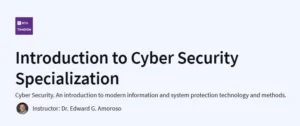What will you in the Cryptography I Course
Cryptographic Fundamentals: Understand the principles of cryptographic systems and how to apply them securely in real-world applications.
Symmetric Encryption: Explore stream ciphers and block ciphers, including the Advanced Encryption Standard (AES) and Data Encryption Standard (DES).
Data Integrity: Learn about message authentication codes (MACs) and hash functions to ensure data integrity.
Authenticated Encryption: Combine encryption and authentication to protect data confidentiality and integrity simultaneously.
Public-Key Cryptography: Delve into key exchange protocols, RSA, and ElGamal encryption systems.
Cryptographic Attacks: Analyze common cryptographic attacks and understand how to defend against them.
Program Overview
Module 1: Course Overview and Stream Ciphers
⏳ Duration: ~4 hours
Introduction to cryptography and its historical context.
Study of pseudo-randomness and stream ciphers.
Discussion on semantic security and the one-time pad
Module 2: Block Ciphers
⏳ Duration: ~3 hours
Examination of block cipher constructions like AES and 3DES.
Understanding modes of operation and their security implications.
Module 3: Message Integrity
⏳ Duration: ~3 hours
Introduction to message authentication codes (MACs).
Implementation of hash functions and their role in ensuring data integrity.
Module 4: Authenticated Encryption
⏳ Duration: ~3 hours
Combining encryption and authentication techniques.
Exploration of real-world applications and potential vulnerabilities.
Module 5: Basic Key Exchange
⏳ Duration: ~3 hours
Study of key exchange protocols and their mathematical foundations.
Introduction to number theory concepts relevant to cryptography.
Module 6: Public-Key Encryption
⏳ Duration: ~3 hours
In-depth look at RSA and ElGamal encryption systems.
Understanding public-key infrastructure and its applications.
Module 7: Final Exam
⏳ Duration: ~30 minutes
Comprehensive assessment covering all course materials.
Get certificate
Job Outlook
High Demand: Cryptography skills are essential in cybersecurity, data protection, and secure communications.
Career Advancement: Proficiency in cryptographic principles can lead to roles such as Security Analyst, Cryptographer, and Information Security Engineer.
Industry Relevance: Applicable across various sectors, including finance, healthcare, government, and technology.
Explore More Learning Paths
Deepen your understanding of digital security and cryptocurrencies with these carefully selected courses, designed to help you apply cryptography principles and explore blockchain technology.
Related Courses
Cryptocurrency and Blockchain: An Introduction to Digital Currencies Course – Learn the fundamentals of blockchain, cryptocurrency mechanics, and the technology behind digital currencies.
Cryptocurrency Investment Course 2025: Fund Your Retirement Course – Explore practical strategies for investing in cryptocurrencies and managing digital assets.
Tracking the Cryptocurrency Market with CoinAPI Using Python Course – Gain hands-on experience analyzing cryptocurrency data using Python and APIs.
Related Reading
What Is Risk Management? – Understand how risk management principles are applied in cryptography, cybersecurity, and digital investments.
Specification: Cryptography I Course
|





